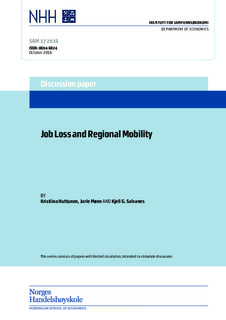| dc.contributor.author | Huttunen, Kristiina | |
| dc.contributor.author | Møen, Jarle | |
| dc.contributor.author | Salvanes, Kjell G. | |
| dc.date.accessioned | 2016-11-29T14:33:22Z | |
| dc.date.available | 2016-11-29T14:33:22Z | |
| dc.date.issued | 2016-11-29 | |
| dc.identifier.issn | 0804-6824 | |
| dc.identifier.uri | http://hdl.handle.net/11250/2423522 | |
| dc.description.abstract | It is well documented that displaced workers suffer severe earnings losses, but not why this is so. One reason may be that workers are unable or unwilling to move to regions with better employment opportunities. We study this and find that job displacement increases regional mobility but the mobility decisions are driven also by non-economic factors such as family ties. As a results, movers tend to be a heterogeneous group.
We find that on average displaced workers who move suffer larger income losses than displaced workers who stay in the same region. However, the entire post displacement income difference between movers and stayers is driven by workers moving to regions where parents live or to rural areas. | nb_NO |
| dc.language.iso | eng | nb_NO |
| dc.relation.ispartofseries | DP SAM;17/2016 | |
| dc.subject | Plant closures, downsizing, regional mobility, earnings, family ties. | nb_NO |
| dc.title | Job Loss and Regional Mobility. | nb_NO |
| dc.type | Working paper | nb_NO |
| dc.subject.nsi | VDP::Social science: 200::Economics: 210 | nb_NO |
| dc.source.pagenumber | 44 | nb_NO |
